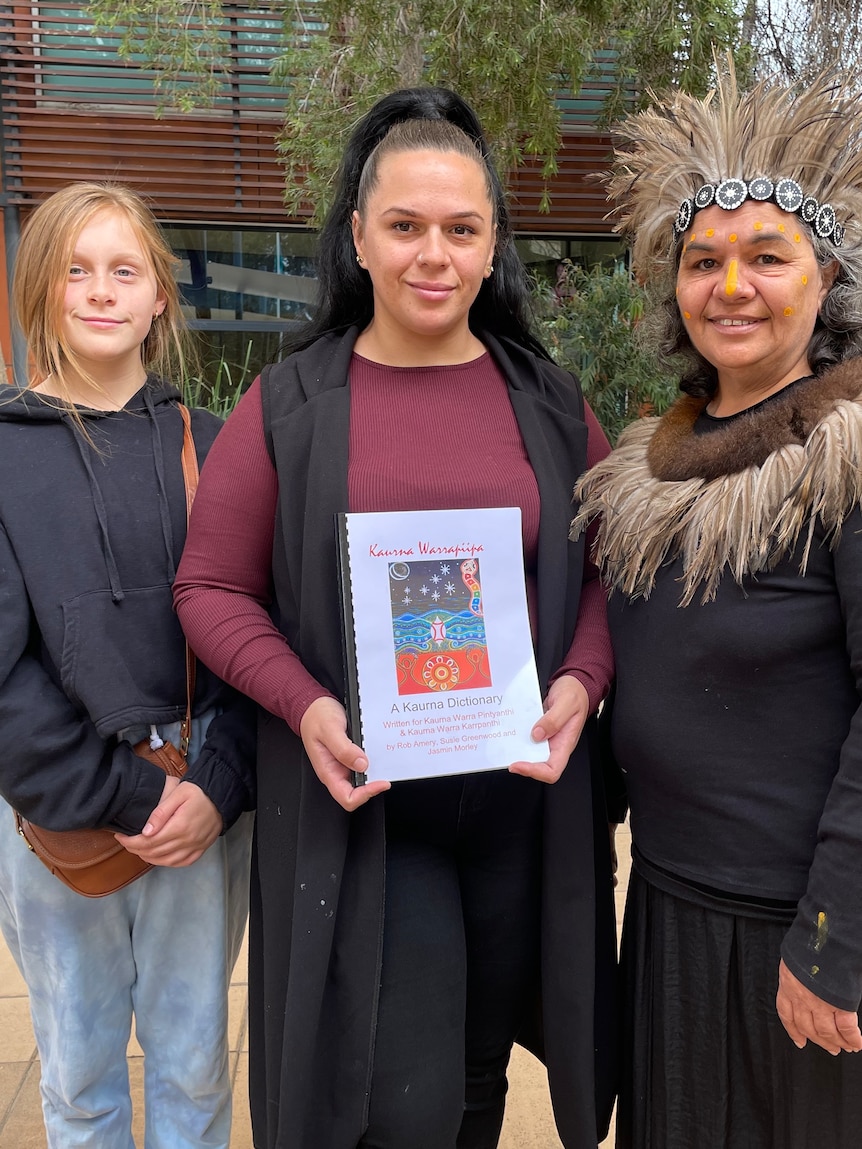Colonial bans on speaking Aboriginal languages meant only a handful of Kaurna words — the Indigenous language of South Australia’s Adelaide Plains — were still in common usage 50 years ago.
Key points:
- Kaurna and other Aboriginal languages are being revived in SA
- Tailored training courses are helping language learners pass their skills back to their communities
- New dictionaries have been devised
The Kaurna language and others are now being revived with the help of linguists and, for the first time, tailored training courses to help language learners pass their skills back to their communities.
Kaurna woman Taylor Power-Smith said learning words spoken by her ancestors, and being able to teach them to her community, had been a way to honour those who came before her.
“This is the greatest inheritance I’ll ever receive and I feel so strongly that fluency will be ours, and our babies will eventually be able to speak in our mother’s tongue,” she said.
She said despite her love of learning, the eradication of the language at the hands of colonial settlers was hard to forget.
“I have really sometimes struggled to balance the gratitude in having my language and the ability to learn it, and the deep sadness that I feel for my ancestors and my family who had it stripped off of them,” she said.
ABC News: Gabriella Marchant
)Ngarrindjeri woman Pauline Ngopamaldi Walker is a graduate of Adelaide training provider Time Education and Training’s first certificate to be specially tailored to Aboriginal language teaching.
The program is hosted at Tauondi Aboriginal College in Port Adelaide.
Ms Walker said as she becomes more confident in her language skills, she plans to use her training certificate to teach others in her hometown of Murray Bridge, on Ngarrindjeri country south-east of Adelaide.
She said while she thought she knew very little language, she was surprised by how much her interactions with her parents, grandparents and extended family had taught her.
“It was just interesting, realising that I really did know more than what I’d actually thought,” she said.
ABC News: Gabriella Marchant
)Ms Walker said part of bringing the language to life in a modern context meant creating Ngarrindjeri words for things her ancestors would never have dreamed of.
For example, she was charged with inventing the Ngarrindjeri word for ‘solar panel’.
“I thought OK, I’m going to call it a ‘sun blanket’ so in language, in Ngarrindjeri, that would be a ‘nanggi tu:thaki’.”
Ngarrindjeri linguist Mary-Anne Gale and her husband, Kaurna linguist Rob Avery, said word lists written by early German settlers had helped them bring both languages back from the brink.
“Some missionaries set about learning the language because they wanted to convert people to Christianity and save souls,” Ms Gale said.
Their work has culminated in the launch of new Ngarrindjeri and Kaurna dictionaries, each with hundreds more words.
ABC News: Gabriella Marchant
)Ngarrindjeri elder Phyllis Pilitjari Williams said the new words and graduate language trainers would help build fluency within her community.
“I’m just so overwhelmed with the fact that we have so many people that have graduated today, and it’s probably the best thing that ever happened to us for quite a while,” she said.
“I’ll be calling on them to ‘get your fingers out and get out there and teach’, which will be great.
“We’re not fluent speakers, but we’re getting there and hopefully in the future it will be our children, grandchildren, great-grandchildren that will be fluently speaking stuff like that.”
ABC News: Gabriella Marchant
)



